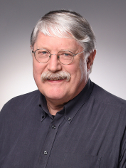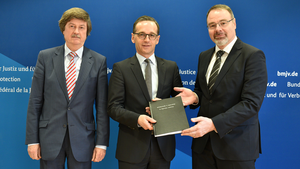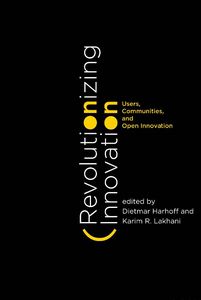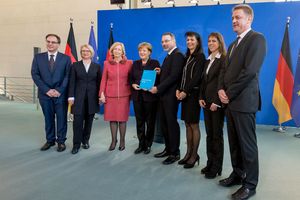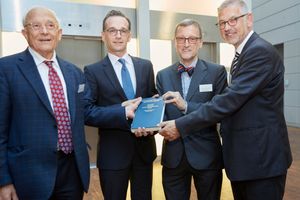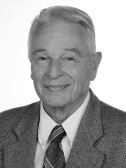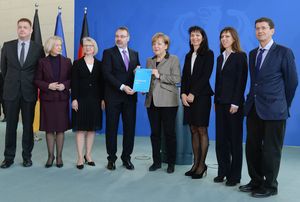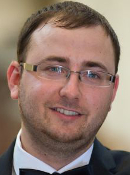
Press release: Max Planck Institute for Innovation and Competition hosts its first “Journalist in Residence”
Manfred Ronzheimer to investigate the renewal of innovation journalism in Germany.
EIPIN awarded grant for European Joint Doctorate
The European Intellectual Property Institutes Network (EIPIN) has been granted EU funding to offer a European Joint Doctorate.
Members of the network, which was founded in 1999 to intensify cooperation between European institutions in the field of intellectual property and their students, are the Munich Intellectual Property Law Center (MIPLC), Queen Mary University of London, University of Strasbourg (CEIPI), Alicante University and Maastricht University.
A total of 15 doctoral candidates will be accepted into the program, which will receive EU funding in the amount of 3.8 million euros over a period of four years. Each of the EIPIN member institutions will supervise three doctoral candidates and act as co-supervisor for three further candidates being advised by one of the other EIPIN member institutions. Also planned in the framework of the doctoral program are internships with leading European organizations in innovative sectors of the economy (e.g. telecommunications, music, seeds) and seminars (e.g. on methodology). Furthermore, participants are intended to participate in the annual EIPIN congress.
EIPIN submitted its proposal, entitled “EIPIN Innovation Society”, in January 2016 within the framework of the EU’s Horizon 2020 program. The goal of the proposal is to investigate the effects of intellectual property rights (IPRs) on the innovation potential of a society as well as how best to design IPRs in order to facilitate and not check innovation.
For EIPIN Member MIPLC the University of Augsburg will be the institution awarding the doctoral degree. The Max Planck Institute for Innovation and Competition, which acted as a supporting institution for the grant proposal and is one of the sponsors of the MIPLC, will collaborate with the University of Augsburg in the running of the program and will provide supervisors for the doctoral candidates.

Study “Copyright and Innovation in Digital Markets” presented to Justice Ministry
On 25 April 2016 Prof. Dietmar Harhoff presented the study “Copyright and Innovation in Digital Markets”, which he co-authored with Prof. Reto M. Hilty and Dr. Alexander Suyer, to Federal Minister of Justice and Consumer Protection Heiko Maas.
The Ministry had commissioned the Max Plank Institute for Innovation and Competition to prepare the study in order to provide a better empirical basis for legal-political discussions of copyright law in the digital age.
Digitalization is a key driver for innovations and the emergence of new business models. Internet-based value-creation processes are increasingly changing the basic conditions for creativity while at the same time opening up new ways to disseminate and use many different types of content. Accordingly, copyright as a legal instrument to promote innovation and creativity is also confronted with new challenges. Its role in this context must be determined not only from a legal, but also from an economic perspective. Basic groundwork for this task includes charting and analyzing those technological and economic changes that digitalization and interconnectedness entail. Trends regarding technological developments and value-creation models are particularly visible in the kinds of young enterprises that are currently introducing innovative, internet-based business models. If there is a connection between their business models and copyright law, this connection can make it possible to draw conclusions as to which basic legal conditions might influence innovation in digital markets in a positive or a negative way.
For the study, 40 startups with internet-based business models were surveyed, whereby “startup” was defined as an enterprise under ten years old implementing an innovative business model or innovative technology and striving for significant growth. The goal of the interviews with the startups was to determine which parameters of copyright law the entrepreneurs saw as containing a potential for conflict with their own business model. Thus the first step was to determine what role copyright-protected content played in the creation of value and who the authors of this content were. Next, it was ascertained what copyright-related questions, insecurities or risks arose for the startups with regard to this content. Finally, the entrepreneurs were asked how they responded to these challenges in their day-to-day business.
The study was commissioned by the German Federal Ministry of Justice and Consumer Protection and carried out jointly by the Max Planck Institute for Innovation and Competition and the Center for Digital Technology and Management (CDTM). A multidisciplinary analysis taking technical, economic and legal aspects into account, the study reveals many of the challenges faced by German copyright law with respect to innovation in digital markets. The work thus provides an empirical basis for drafting proposals for a reform of German copyright law.
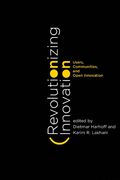
Eric von Hippel and the User Innovation Paradigm
"Revolutionizing Innovation: Users, Communities, and Open Innovation" now published by MIT Press.
“Revolutionizing Innovation: Users, Communities, and Open Innovation”, edited by Dietmar Harhoff (Director at the Max Planck Institute for Innovation and Competition) and Karim R. Lakhani (Associate Professor of Business Administration at Harvard Business School), has now been published by MIT Press (https://mitpress.mit.edu).
The volume provides a comprehensive and multidisciplinary view of the field of user and open innovation, reflecting advances in the field over the last several decades. The book is dedicated to the economist Eric von Hippel who, since the 1980s, pioneered a groundbreaking view of innovation. Von Hippel shows that in many cases users of products and services create innovations and that subsequently producers take up these innovations and develop them further. Thus he counters the dominant paradigm which casts profit-seeking firms as the main drivers of technological and organizational change. In their research projects, von Hippel and colleagues found empirical evidence that flatly contradicted the producer-centered model of innovation. Large parts of the knowledge economy now routinely rely on user innovation, communities, and open innovation to solve important technological and organizational problems.
The contributors to the volume—including many colleagues of Eric von Hippel—offer both theoretical and empirical perspectives from such diverse fields as economics, the history of science and technology, law, management, and policy.
On 17 March 2016, 6:00 -8:00 p.m., Eric von Hippel himself will give a lecture about “Free Innovation and the Internet” at the new Munich Center for Internet Research (MCIR) of the Bavarian Academy of Sciences and Humanities addressing the question how the internet modifies innovation. The presentation followed by a discussion can also be watched via live stream (http://www.mcir.badw.de/). The viewers may ask questions via live chat. See also: http://www.ip.mpg.de/en/the-institute/events/free-innovation-and-the-internet.html.
Press release: Max Planck Institute for Innovation and Competition: Web Relaunch
With its new homepage, the Munich research institute places its new profile in the spotlight alongside its interdisciplinary work, diverse projects and publications.

Commission of Experts for Research and Innovation (EFI) presents annual report 2016 on research, innovation and technological performance in Germany to German Chancellor Merkel
On February 17, 2016, the Commission of Experts for Research and Innovation chaired by Prof. Dietmar Harhoff, Ph.D., Director at the Max Planck Institute for Innovation, has presented the ninth report on research, innovation and technological performance in Germany to the German Chancellor Angela Merkel. The Commission of Experts for Research and Innovation (Expertenkommission Forschung und Innovation - EFI) provides scientific advice to the German Federal Government and periodically delivers reports on research, innovation and technological productivity in Germany. A key task is to provide a comprehensive analysis of the strengths and weaknesses of the German innovation system in an international comparison. Furthermore, Germany's perspectives as a location for research and innovation are evaluated on the basis of the latest research findings. EFI presents proposals for national research and innovation policy.

“Reflections on the Future of Copyright” with Heiko Maas in the Max Planck Institute for Innovation and Competition
Presentation of the festschrift to mark the 50th anniversary of the German Copyright Act / Federal Minister of Justice and Consumer Protection speaks on current issues of copyright policy
The Max Planck Institute for Innovation and Competition celebrated the 50th birthday of the German Copyright Act on September 9, 2015 with a book presentation: on September 21 the special publication entitled “50 Jahre Urheberrechtsgesetz – Vom Magnettonband zu Social Media” (“50 Years of Copyright Law – From Magnetic Tape to Social Media”) was presented to Heiko Maas, Federal Minister of Justice and Consumer Protection.
After words of welcome from Institute Director Reto M. Hilty; his co-editor Thomas Dreier; and the book’s publisher, owner of Verlag C.H.Beck, Hans Dieter Beck, the Justice Minister – the “patron” of German copyright – received a copy of the festschrift hot off the press. Besides taking a look at the past five decades, the volume, which Dreier and Hilty co-edited and co-authored together with some 30 contributors including scholars, practitioners and officials, also focuses particularly on the need for legislative action in the future.
In the Justice Minister’s subsequent speech, in which he identified the Max Planck Institute for Innovation and Competition as “the most important European think tank for intellectual property and copyright”, Maas described current copyright issues, forayed into the history of copyright law and concluded by formulating various working hypotheses for the copyright policy of the future.
Addressing the central points of national copyright policy, Maas named four current projects: copyright contract law, the reform of the law governing collective rights management organisations, the education and research exception and the adaptation of copyright law to the demands of the digital age.
Maas offered thanks to Institute Director Josef Drexl and his team for their dedicated support of the reform of the law on collective rights management organisations: “You really supported our negotiations on the Directive in Brussels and our work on the draft law. Your know-how in this difficult area, which is legally and technically very complex, was very helpful for us.”
The Max Planck Institute also plays a special role in the adaptation of copyright to the phenomenon of digitalisation, said Maas: So as to lay a better empirical foundation for the legal policy discussions, the Justice Ministry commissioned Dietmar Harhoff, the Institute’s Managing Director and head of its economics department – not in attendance due to a trip to Japan – together with Reto Hilty to perform an interdisciplinary study. While Harhoff’s team collected data to find out which business models are current among founders and how business founders treat copyright-protected content – and thus copyright itself – Hilty performed the legal assessment of the data.
The Justice Minister’s speech was followed by 45 minutes of discussion, in which several audience members participated. Maas answered Hilty’s closing question of what request he would make of the Max Planck Institute for Innovation and Competition with the admonition: “think the impossible”.
Hilty expressed satisfaction with the event, which drew 170 guests, most of them German copyright experts, to the Institute and closed with a reception: “I am amazed at all the different participants – we certainly chose a hot topic!”.
The participants also deemed the event a success: “Copyright must continue to be protected in the best way possible taking into consideration the constant technological developments – as a patent engineer, I would like to do my part”, said Peter Anders of Grünecker Patent Attorneys and Attorneys-at-Law. “Today I had the opportunity to learn about further developments in the field, and I will incorporate that into my work. Your event gave me an excellent chance to do that and also to network with colleagues”, Anders added.
Speech of Heiko Maas, Federal Minister of Justice and Consumer Protection
In Memoriam Prof. Wolfgang Fikentscher
For the past several decades, Wolfgang Fikentscher was recognized internationally as one of Germany's great legal scholars. After his studies in Erlangen and Munich, his career path led through the Universities of Münster and Tübingen to a professorship at the Faculty of Law of the University of Munich. Parallel to his function as External Scientific Member at the Max Planck Institute for Innovation and Competition, he chaired the Commission for Studies in Cultural Anthropology within the Bavarian Academy of Sciences. He was also the Director of the Munich Office of the Gruter Institute for Law and Behavioral Research. His wide range of international experience included LL.M. studies at the University of Michigan in Ann Arbor, as well as guest professorships and fellowships in places as diverse as Georgetown University, Ann Arbor, Yale, Nanjing, the Netherlands Institute of Advanced Study, the Santa Fe Institute and not least at the University of California at Berkeley, where several years into his retirement he still regularly taught law and anthropology. Among the many honors he received are an honorary doctorate from the University of Zurich, the German Order of Merit First Class, the Bavarian Order of Merit and a Max Planck Research Prize for the research in law and anthropology he carried out with his friend Robert Cooter.
Wolfgang Fikentscher actively promoted many young scholars. With his vision and his wealth of ideas, he enriched the thinking of many students and doctoral candidates. Up until his death he always enjoyed exchanging ideas with the many scholarship holders and guest researchers at the Max Planck Institute for Innovation and Competition.
To describe Wolfgang Fikentscher as an expert in civil law and economic law, as a methodologist and a legal anthropologist, would not do full justice to his work. This work reflects not only an astonishingly wide range of interests both within law and across disciplines, but also his incredible visionary power. His central publications were regularly ahead of their time.
This is also true of the projects he conducted in association with the Max Planck Institute for Innovation and Competition. Long before competition law was fully established as a field of research at the Institute in 2002, it was he who promoted the conviction that research in intellectual property law needed to be complemented by competition law. For many years, he headed a research group at the Institute on the transfer of technology. Among his great accomplishments in this area are his two-volume textbook on national, European and international economic law (Wirtschaftsrecht), which was translated into Chinese, his collaboration with UNCTAD on the development and drafting of a Code of Conduct on Transfer of Technology (TOT Code), and finally the text prepared on his initiative by an international group of scholars for an international competition law agreement (Draft International Antitrust Code) in 1993. This so-called "Munich Code" grew out of his firm belief that, ultimately, even the emerging WTO system needs binding competition rules.
In the years following his retirement, Professor Emeritus Wolfgang Fikentscher was most passionate about law and anthropology. His endeavor in this field to always conceptualize legal issues concerning the regulation of the economy from the perspective of the individual, by taking into account the individual's freedom to act and his or her roots in a certain culture, stands for Wolfgang Fikentscher the humanist. His conviction that the economy too must have rules to ensure that business serves people, and not the other way around, has found renewed support in the wake of the latest banking and economic crises. Wolfgang Fikentscher never stopped working to find solutions to the fundamental economic problems of mankind. In one of his last contributions, under the title "FairEconomy", he proposed an alternative approach to respond to the current economic and financial crisis by particularly building on his anthropological insights.
The Max Planck Institute for Innovation and Competition mourns the loss of a great scholar and a highly dedicated and supportive colleague whose openness to new ideas, diverse cultures and human beings in particular will be remembered by all. His sudden death fills us with sorrow. We extend our condolences to his family, above all to his wife Irmgard and his children and grandchildren.

Commission of Experts for Research and Innovation (EFI) presents annual report 2015 on research, innovation and technological performance in Germany to German chancellor Merkel
On February 25, 2015, the Commission of Experts for Research and Innovation chaired by Prof. Dietmar Harhoff, Ph.D., Director at the Max Planck Institute for Innovation, has presented the eighth report on research, innovation and technological performance in Germany to the German chancellor Angela Merkel. The Commission of Experts for Research and Innovation (Expertenkommission Forschung und Innovation - EFI) provides scientific advice to the German Federal Government and periodically delivers reports on research, innovation and technological productivity in Germany. A key task is to provide a comprehensive analysis of the strengths and weaknesses of the German innovation system in an international comparison. Furthermore, Germany's perspectives as a location for research and innovation are evaluated on the basis of the latest research findings. EFI presents proposals for national research and innovation policy.
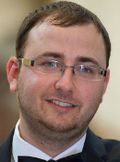
Martin Husovec named Affiliate Scholar at Stanford Law School’s Center for Internet & Society
Martin Husovec, a scholarship holder and an IMPRS-CI doctoral candidate at the Munich-based Max Planck Institute for Innovation and Competition, has been named Affiliate Scholar at Stanford Law School's Center for Internet & Society (CIS) for 2014-2016. Within his affiliation project, Martin Husovec will work on acquainting a broader audience with his doctoral research on the optimal accountability of Internet intermediaries for third-party wrongdoing in the field of intellectual property law. More »

